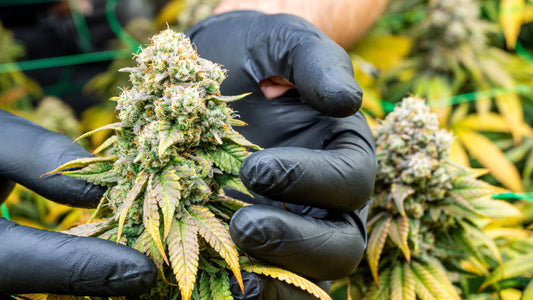The Teesside Cannabis Club (TCC), founded by Michael Fisher (formerly aliased as “John Holiday”), has evolved from a small, local initiative into a nationally recognized entity at the forefront of cannabis reform in the UK. Its journey, marked by early opposition, strategic collaborations, and a steadfast commitment to its core mission, proves a compelling case study for a harm reduction approach to drug policy, and a testament to the bravery it takes to fight for change.
The Wild West Beginnings
The club's roots trace back to 2011-2012 when Fisher was inspired by the culture and vibe of a Cannabis Social Club (CSC) he visited in Spain. Motivated to establish something similar in the UK, he returned home and, in 2013, launched a Facebook page called the "Teesside Pro Cannabis Movement". To avoid issues with local authorities, he used the pseudonym "John Holiday".
“I set up the first event which was a toke-and-talk, which was done at an outdoor country park. I figured that if the police were going to turn up I would have a better vantage point from across the hill looking down so I'd be able to see them in the car park. Cleveland police were the first people to turn up at that event, but they didn't know who they were looking for.”
“Each week I did a toke-and-talk, and more and more people sort of gathered and it got more momentum. Still didn't have a cannabis social club. During this time, I drove from Middlesborough up to Scotland, which is probably a round trip of about 300 miles, giving away free cannabis seeds and hemp seed to anyone that had followed the page or was following the page.”
Catch Me When You Can
A pivotal moment in the club's history came when a journalist, early in her career, reached out to Fisher. Fisher, revealing his true identity to her under the condition that his photograph would not be published, agreed to work together. This partnership would result in significant national press coverage for the Teesside Cannabis Club, raising its profile from a local movement to a nationally recognized entity.
And with that recognition came more police attention…
“So [there’s] Durham police, which is up north, towards where I drove through their territory heading up to Scotland. They had got in touch with the journalist and asked if I would meet with them. So me, very much feeling it was the wild west (and I was a bit of an outlaw at the time, thinking that there was no support for this), I sent a message back: go f*** yourself, catch me when you can.”

Ronald Hogg and the Evolution of the Club Model
A turning point for the TCC's legitimacy and long-term survival was its relationship with Ronald Hogg, the Durham Police Crime Commissioner. Hogg, a trailblazer who wanted to see drug reform happen in his lifetime, was intrigued by the club's activities and invited Fisher to come have a cup of tea. This interaction, which began with Fisher's initial refusal and a casual "go f--- yourself," evolved into a crucial partnership.
“I ended up smoking probably about 7 to eight grams of cannabis in the car trying to build up the courage to go into the [police] headquarters. I walk into the police headquarters and I'm reeking of cannabis. I'm oblivious to this because, a classic stoner, we don't realize how strong we smell.”
“I say ‘I'm here to see the police crime commissioner’ and they look at me as if I need sectioning. They said ‘he doesn't see people just walking off the street’. I was like ‘No no, tell him John Holiday is here - he’ll be expecting me’. I head into his office, seven security doors later, and this rare gentleman, grabs my hand, grips it, and says, ‘Michael,’ calling me by my first name and my proper Christian name, ‘I've had a room dedicated to you for 6 months. How come you're not selling cannabis anymore? You’re just giving it away’. Sort of laughing nervously, I said, ‘Well, cuz I knew you all would be looking.’”
Hogg, who had returned from retirement to help change drug laws, saw drug use as a health and social issue rather than a criminal one. He didn’t lure Fisher into a trap to arrest him. He wanted to approach things differently.
“It was: ‘We might not agree on everything. I've got some ideas. I'd like to hear your ideas. I hope at the end of the day we can at least find some common ground and agree on some things.’”
Hogg even invited Fisher to an international drug policy symposium, where Fisher, as a representative of the TCC, was among prominent figures like top judges and the ex-president of Switzerland.
The club's initial model, which simply provided a space for cannabis consumption, did eventually encounter some problems with unauthorized drug dealing. Fisher returned to Hogg for guidance, and together they developed a new model. This model, similar to the Spanish system, designated the club as the sole supplier of cannabis to its members, effectively curbing the black market activity. This model, which was refined over multiple iterations with Hogg’s input, became the basis for the club's operations and was presented to 43 police forces in 2018. Fisher still credits Hogg as the "patron saint" of the club, stating that without his support, the club would not exist. Hogg sadly passed away in 2019. Fisher views the continued operation of the club as a way to honor his legacy.

Community Impact and Future Vision
The Teesside Cannabis Club has grown to serve 1,100 members from all walks of life, including medical professionals, ex-police officers, and people with disabilities. It maintains alliances with local and national drug charities and rehabilitation services, and has even received referrals from the Department for Work and Pensions. During the COVID-19 pandemic, the local council deemed the club an essential business and provided funding, with public health officials advising them to implement a click-and-collect service.
The club's ethos is rooted in harm reduction and community. Fisher sees cannabis as an "exit drug" from other addictions and emphasizes the club's role in providing a safe, social setting where members feel accepted and supported. He recounts stories of members who, despite their illnesses, found the club to be a lifeline, offering a better quality and longer end-of-life experience.
Looking to the future, Fisher advocates for local authorities to license cannabis clubs, arguing that this would generate substantial revenue for struggling councils and deter criminal gangs. He has faith that recreational cannabis will eventually be legalized in the UK, driven by the government's need for revenue. The club also has its sights set on international expansion through a partnership in Spain, and potentially even into Thailand.
Teesside also recently took over management at Cannabliss Marbella for an exciting new collaboration. The brand resonated with the club’s harm reduction and well-being outlook. Cannabliss has an outdoor seating area, a pool that members are free to use, and the space regularly hosts events focused around well-being and fitness. This will enable the club to provide more services and resources to members of both clubs and increase community engagement. A launch party is planned for September 13th to celebrate this new collaboration. Tickets and memberships are available by contacting info@cannablissmarbella.com.
To become a member of Teesside Cannabis Club sign up here. If you stop in, be sure to check out the custom TerpLoc® pouch in your welcome kit.
The Teesside Cannabis Club's history, one we’re only scratching the surface of here, is a testament to the importance of public advocacy, the courage it takes to push against the grain, and the power of a community-focused approach to drug policy. By working with, rather than against, local authorities and focusing on the social and health benefits of cannabis, the club has created a model that is both revolutionary and enduring. It stands as a beacon for cannabis reform, a rarity whose continued existence is seen as magical and vital for preventing setbacks in the UK's cannabis reform journey. IYKYK.




